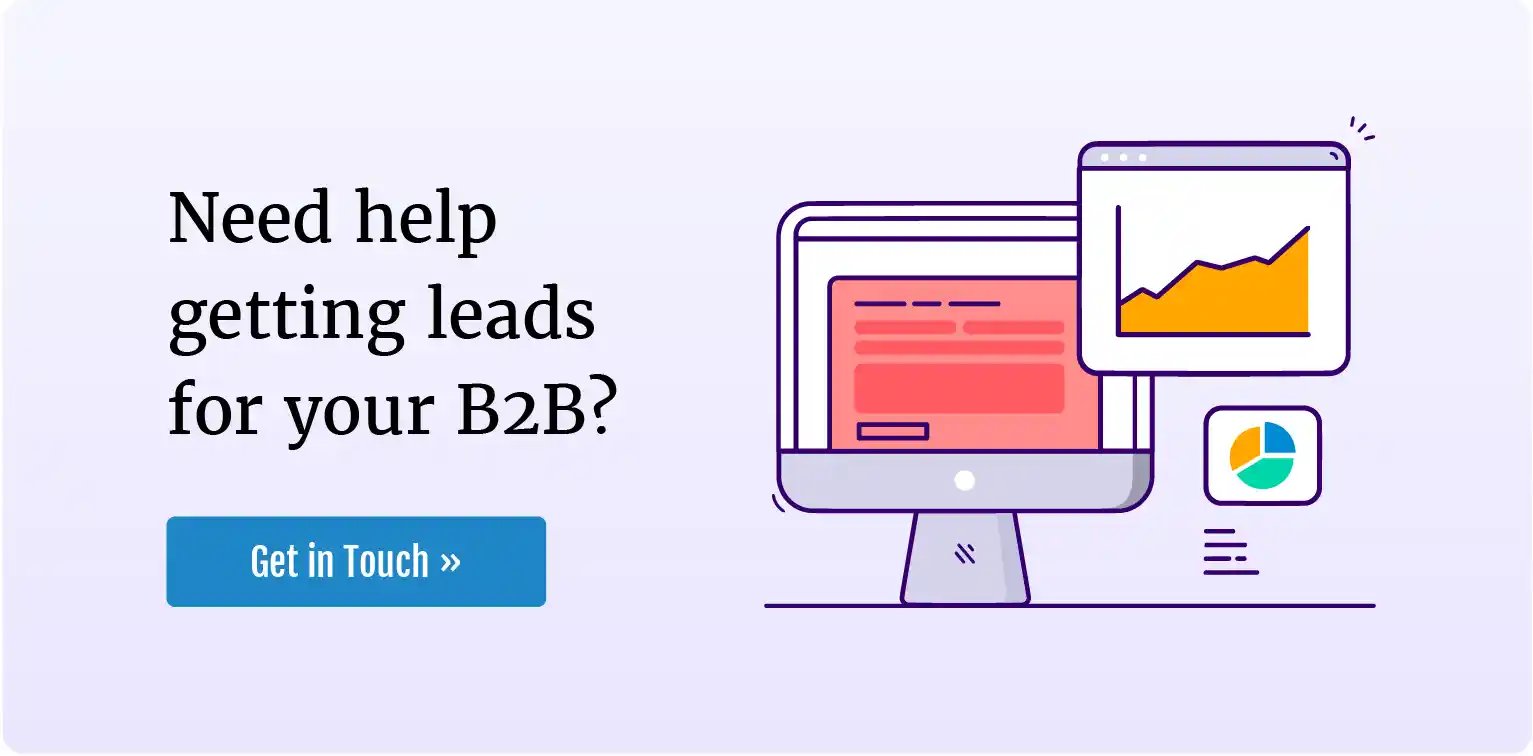Many companies have been there: You’ve been working with an agency for a few months, or even years. The agency can’t provide quantitative results from their work, doesn’t tell you what they’re doing, or constantly ignores calls and emails.
These are just a few reasons businesses end a relationship with an agency. But in situations that are less clear-cut, how do you know when it’s time to switch? What if you like your current agency, but you want to launch a campaign outside their area of expertise?
In this post, we’ll explore:
- Common signs your agency is underperforming;
- What you can do to test these hunches;
- When to talk with your agency before firing them; and
- Whether you should work with more than one agency at a time.
8 Signs your agency is underperforming
1. They can’t demonstrate quantitative results tied to your business goals.
A common, and major red flag of an incompetent agency is when they cannot provide data that demonstrates whether you are meeting, exceeding, or falling short of your business goals.
This can take a couple forms.
They’re not tracking metrics.
Maybe you set goals together, but they aren’t tracking any metrics to demonstrate progress toward those goals, or maybe they never set goals with you in the first place.
They’re tracking the wrong metrics.
Others may provide “vanity” metrics, which are numbers that look good on paper, but upon closer examination cannot tell you anything about progress toward your goals.
When you ask questions about performance and other metrics, these agencies may even deflect or blow off your question, instead pointing back to the vanity metrics.
Check:
If you’re uncertain whether your agency falls into the category above, ask yourself if they’re actively providing numbers that tie the performance of their activities to your business goals. Are they hitting the benchmarks within the time period they set?
2. They’re secretive.
Another common red flag is when an agency won’t tell you what marketing activities it is completing on your behalf, or is consistently vague or mystical when you ask about their methods.
In general, digital marketing best practices are common knowledge within the industry. While agencies may have figured out their own strategies of combining these techniques, there are rarely, if ever, any proprietary magic bullets.
While digital marketing can get technical, a good agency should be able to answer your questions in a way that doesn’t require a computer science degree to understand.
When an agency won’t reveal what they are doing to, for example, improve search engine rankings, it’s possible they are inexperienced and don’t really know what they’re doing, or are engaging in dishonest, “black hat,” practices, such as buying links.
At best, an inexperienced agency could be using methods that don’t work anymore. At worst, these agencies could actually harm your website and search rankings, leaving you and your next agency to clean up the mess.
Check:
Ask yourself:
- Are they willing to tell me what methods they’re using to get results?
- Are they describing their marketing methods as proprietary magic bullets?
- Are they willing to thoroughly answer my questions and address my concerns?
3. They’re controlling.
Agencies regularly require access to client accounts, such as analytics software and CRMs to complete necessary tasks for clients.
However, some agencies will try to limit or gatekeep their clients’ access to these very programs. This is a major red flag.
Agencies that engage in this type of behavior are often insecure. They’re afraid their client will leave them for another agency. When this happens, they frequently obstruct the clients’ and new agencies’ access to essential resources.
Check:
Do you feel locked into a relationship with an agency, where leaving them is so difficult that it feels like more trouble than it’s worth? If so, consider firing them immediately.
4. They aren’t responsive.
If an agency doesn’t respond to your phone calls, emails, or other communication channels, has consistent trouble meeting deadlines, and/or keeps apologizing for mistakes they’ve made without making any effort to fix them or change course, it might be a good idea to take your business elsewhere.
5. You’re suffering from the agency’s churn.
While some churn resulting from employees changing positions and new employees coming onboard may be the sign of a healthy agency, the performance of your campaigns and customer experience should not be interrupted. This is a sign of operational weaknesses within the agency.
In situations like these, companies may find themselves working with a rotating door of account managers who are not properly briefed on their business, need access to the same accounts, or change strategy mid-stream.
As a result, these clients may find themselves needing to educate the agency on the same issues repeatedly or provide access to the same accounts. Worse, the account manager’s ignorance about the client’s business can lead to work that doesn’t meet the company’s needs.
Check:
If you change account managers more than once a year and feel like you’re answering the same questions repeatedly, you may have a better experience elsewhere. It’s the agency’s responsibility to keep track of essential information about your business and train employees accordingly.
6. They don’t have a realistic, organized plan.
Agencies that say yes to everything you ask for, make all kinds of promises, set goals they can’t achieve, or ask you what to do are likely not the most thoughtful or competent partners you could ask for.
Good agencies regularly push back on requests when asked to do something that violates best practices or will likely yield a poor return for the business.
They will also set specific, reasonable goals to be achieved at a particular time, tied directly to your business’s objectives and needs. And they should be able to demonstrate quantifiable results that signify completion of and progress toward these goals.
Typically, good agencies don’t guarantee specific outcomes because digital marketing involves so many moving parts, including some beyond their control.
If they don’t meet their goals, they will adjust expectations and often tweak their strategy. If their goals are consistently unrealistic, they probably aren’t worth your time and money.
7. Their strategy is generic.
When you approach and work with a good agency, they will ask a lot of questions about your business in order to educate themselves about what you need. Without understanding your business, industry, customers, objectives, and available resources, it’s impossible to come up with a tailored digital marketing strategy.
You should be suspicious of an agency that doesn’t do this, as it could indicate a one-size-fits-all approach to strategy that will likely yield inferior results.
If you find that the agency is delivering content, for example, that is not completely relevant to your customers’ needs, more than likely they didn’t take the time to learn enough about your audience.
8. They’re trying to sell you services that don’t benefit you.
An agency salesperson trying to upsell you a product or service is par for the course, but if they’re constantly working on you to purchase additional offerings you don’t need, that could be a red flag.
Check:
Is the salesperson constantly trying to upsell? Are they trying to get you to purchase something that isn’t helpful for your business but makes more money for them? If so, you can do better.
When to talk to an agency before firing them
As we’ve seen, incompetent agencies can fail clients in many ways, necessitating a parting of ways. But when an agency doesn’t display any obvious red flags like the ones above, yet you’re disappointed in the results they’ve gotten for you, it may be a good idea to have a meeting with them first.
Ask them why you’re getting these results. It’s a positive sign if:
- The agency reaches out to you first, because they already spotted the disappointing data; and
- They take active steps to adjust their strategy to improve performance. Your agency should be paying close enough attention to know when something isn’t working.
It’s also possible something appears to be wrong, but not enough time has passed to see significant results. These tend to be cases of misaligned expectations.
SEO, for example, can easily cause this type of misunderstanding. It regularly takes a few months to a year to generate significant results, and this timeline is a little different for every website.
As a lead generation tactic, we view SEO as a steady, long game, and clients of ours have enjoyed significant success from SEO in the medium to long term.
On the other hand, SEO is not a great choice for a company that needs an influx of leads right away. If a client doesn’t understand this from the beginning, it can be very frustrating.
If you determine there has been a misunderstanding, you can do a post-mortem together and determine whether this agency can still help you achieve what you need.
If not, it may be time to part ways. Conversely, the agency may be able to use this new information to completely shift your strategy in a different direction that will suit your needs better.
“Should I use multiple agencies?”
Sometimes, you like the agency you’re working with, but they can’t meet a need that’s arisen. For example, maybe you need help with branding, but your current agency doesn’t have expertise in that area.
Do you fire them and hire an agency that says they can do everything, or hire a second agency?
Working with more than one agency at a time can be a challenge for smaller companies, because it tends to be expensive and more difficult to coordinate, since you’re dealing with multiple teams.
However, for larger companies, working with multiple, niche agencies is practically unavoidable as their needs grow increasingly large and disparate.
And, with larger budgets and staff at their disposal, this actually makes a lot of sense: Would you rather work with a selection of specialists who are consistently amazing at one thing, (HubSpot, SEO) or work with a single agency that may be spread too thin?
Of course, this sort of competency varies on a case-by-case basis. You may also encounter niche providers trying to upsell you a side service that isn’t as good.
At the end of the day, the number of agencies you work with doesn’t matter: finding competent, trustworthy partners for each of your needs is the key.
When thinking about agency hiring decisions, we recommend that you:
- Identify each of your goals;
- Tie each goal to one or more competencies; and,
- Find an agency with that competency.
In general, the more disparate your needs, the more likely it is you’ll require multiple agencies to fill them.
Next Steps
Cutting ties with an agency is not the most pleasant process, but sticking with them when you could be working with a competent, trustworthy partner that treats you with respect could be even more costly.
We wish you luck in your agency research process. Check out our post about choosing a great agency partner to identify signs of reliable (and unreliable) agencies before you sign with them.
Wondering if we have the right competencies for your needs? Get in touch today to have a conversation.
Topics: Working with an Agency





